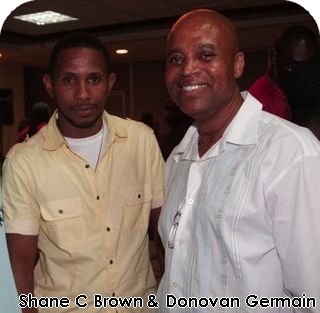 |
Interview with ... |
|
You began your engineer's career in Tuff Gong studio with your father Errol. Which memories you keep of this time ?
I began my engineering career at Tuff Gong studio. Working at Tuff Gong was very memorable, being able to work with some great musicians, producers, artistes and engineers like Sly and Robbie, Clive Hunt, Jeffery Chung, Mikey Riley, the entire Marley family, Jimmy Cliff, Alpha Bondy, Dennis Brown, just to name a few. But the one that sticks with me to this day was voicing Chaka Khan. That was such an experience because her vocal range is so great, she don't need to be directly in front of the microphone and her voice comes directly at you. Dave and Tony Kelly were still in Tuff Gong at that time ? The Kelly brothers were no longer there at that time. Can you describe the specificities of the recording engineer's work and that of the mixing engineer ? The specifics of a recording engineer is to ensure the quality of the recording is at its best. The recording engineer works with the producer making sure he, the producer, is comfortable and his production as far as quality and playback balances. The mixing engineer on the other hand is responsible for the final sound of the song coming out of the studio at its best quality. Once the recording process is done, the mixing engineer puts all that has been recorded together, fine tuning all instruments and voices alike individually, then balance them all together resulting in the final mix which should be past by the producer. What differences you observe when you produce or mix new roots riddims and dancehall riddims ? The differences of producing and mixing roots to dancehall music is roots music is more musical and organic. By organic I mean more accoustic instruments while dancehall is more electronically driven, a lot of samples are used. None the less the same techniques are applied to mixing and producing them both. Who are your favorite artists among the current generation ? My favourite artistes among the current generation are Busy Signal, Queen Ifrika, Mavado, Konshens, Tarrus Riley, Romain Virgo, Etana, Assassin, Peetah from the Morgan Heritage fame and a new artist I'm working with, Timeka Marshall. Your father worked on Germain's former label Revolutionary Sounds. Is it him who introduced you to Germain ? My father did a lot of work with Donovan Germain in the past but he didn't introduce me to Germain. We both met in Barbados at a show called "Reggae On The Hills" and Germain later contacted me to do some mixes for him to which I happily agreed because the Penthouse brand is great and well established and it was an honor as far as I was concerned to be a part of its legacy. Germain opened his new high tech studio on Ballater Avenue in 2006. Tell us about Penthouse new studios equipments. Penthouse has been updated with the latest state of art equipment being use now in our very competitive industry. The studio is equiped with protools HD and uses Tannoy and NS10 speaker monitors. You formed your own label Juke Boxx Productions in 2004. What differences do you make between your own productions and the work that you realize for Penthouse Records ? Working on Penthouse Production and my own production, the difference is I am the producer and engineer for Juke Boxx and with Penthouse I'm only the engineer working for Germain so I work to facilitate his musical taste but the end results as far as quality is concerned is definately the same. As an engineer/producer is very important to know my role at specific times, this is quite easy for me because before a producer I was an engineer and understands my functions very well as far as knowing the producer's and the engineer's role. What is great about Germain and myself is that we both have mutual respect for each other's opinion and this has lead to us being a team and nothing beats teamwork. How a reggae producer can make money in these tough economical times ? To make money in these times as a reggae producer one have to be strategic, since music isn't selling as before it's good for the producer to have a "camp" of artists working with, preferrably managing them so one can earn once the artists are earning. To conclude, what are your plans ? My plans for the future is to continue to try and help with the development of your music industry with quality music and good artist development, also I want to develop Juke Boxx to be a full entertainment company that offers the total package as far as management, engineering, production, booking and public relations. |


